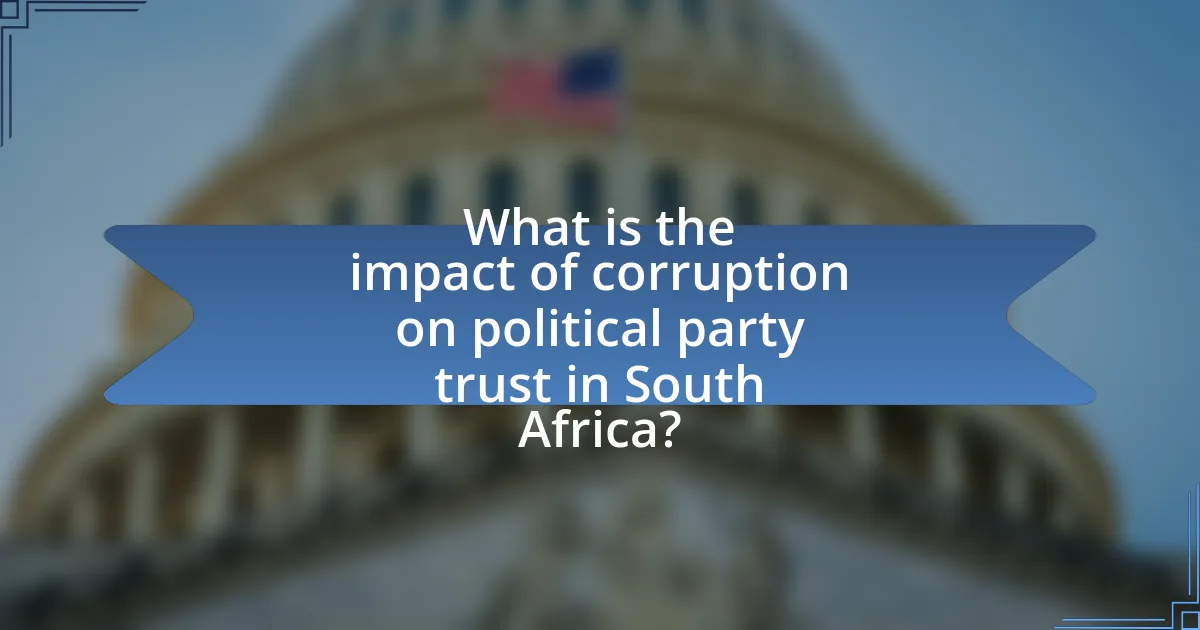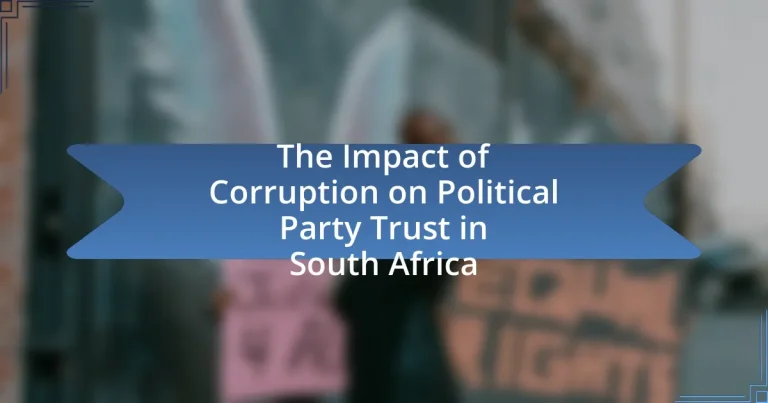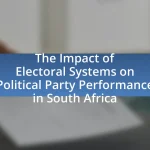The article examines the significant impact of corruption on political party trust in South Africa, highlighting how public perception of corruption diminishes voter confidence and engagement. It discusses the correlation between widespread corruption and declining support for major political parties, particularly the African National Congress (ANC), and the resulting political instability. Key factors influencing public trust, such as transparency and accountability, are analyzed, along with the historical context of corruption in South African politics. The article also explores the implications of corruption on electoral outcomes, governance, and the role of civil society and media in combating corrupt practices.

What is the impact of corruption on political party trust in South Africa?
Corruption significantly undermines political party trust in South Africa. Public perception of corruption within political parties leads to decreased confidence among voters, as evidenced by the decline in support for the African National Congress (ANC) following numerous corruption scandals, including the state capture allegations involving former President Jacob Zuma. According to the 2021 Afrobarometer survey, 62% of South Africans believe that corruption is widespread in the government, which correlates with a growing disillusionment with political parties and their ability to govern effectively. This erosion of trust can result in lower voter turnout and increased support for opposition parties, further destabilizing the political landscape.
How does corruption influence public perception of political parties?
Corruption significantly undermines public perception of political parties by eroding trust and credibility. When political parties are associated with corrupt practices, such as bribery or misappropriation of funds, public confidence diminishes, leading to increased skepticism about their integrity and intentions. For instance, a 2021 survey by the South African Institute of Race Relations indicated that 78% of South Africans believe that corruption is widespread in government, which directly correlates with declining support for ruling parties. This perception can result in lower voter turnout and increased support for opposition parties that position themselves as alternatives to corrupt incumbents.
What are the key factors that shape public trust in political parties?
Key factors that shape public trust in political parties include transparency, accountability, performance, and public engagement. Transparency in decision-making processes allows citizens to understand party actions, while accountability ensures that parties are held responsible for their decisions. Performance, particularly in delivering on promises and addressing public concerns, directly influences perceptions of trustworthiness. Public engagement through open dialogue and responsiveness to citizen needs fosters a sense of connection and reliability. Research indicates that in South Africa, high levels of perceived corruption significantly diminish trust in political parties, as evidenced by surveys showing that over 70% of citizens believe corruption is widespread among political leaders.
How does corruption alter the relationship between citizens and political parties?
Corruption significantly undermines the relationship between citizens and political parties by eroding trust and fostering disillusionment. When political parties engage in corrupt practices, citizens perceive them as self-serving entities rather than representatives of the public interest. This perception is supported by studies indicating that high levels of corruption correlate with decreased voter turnout and increased political apathy, as seen in South Africa where trust in political institutions has declined due to numerous corruption scandals involving prominent leaders. Consequently, citizens may become disengaged from the political process, feeling that their participation has little impact on governance, which further exacerbates the cycle of corruption and distrust.
Why is political party trust important for democracy in South Africa?
Political party trust is crucial for democracy in South Africa because it fosters citizen engagement and participation in the political process. When citizens trust political parties, they are more likely to vote, participate in civic activities, and hold elected officials accountable. This trust is essential for the legitimacy of democratic institutions, as evidenced by the 2021 South African Citizen Satisfaction Index, which indicated that higher trust in political parties correlates with increased voter turnout and civic involvement. Furthermore, a lack of trust can lead to political apathy and disillusionment, undermining the democratic framework established post-apartheid.
What role does trust play in voter engagement and participation?
Trust is a critical factor in voter engagement and participation, as it directly influences individuals’ willingness to participate in the electoral process. When voters trust political parties and institutions, they are more likely to engage in voting and other civic activities. Research indicates that high levels of trust in government correlate with increased voter turnout; for instance, a study by the Electoral Commission of South Africa found that trust in political parties significantly affects citizens’ likelihood to vote, with a 20% increase in turnout among those who express high trust levels. Conversely, low trust, often stemming from perceptions of corruption, can lead to voter apathy and disengagement, as seen in various surveys indicating that citizens who perceive high levels of corruption are less likely to participate in elections. Thus, trust serves as a foundational element that enhances or diminishes voter engagement and participation.
How does a lack of trust affect electoral outcomes?
A lack of trust significantly undermines electoral outcomes by decreasing voter turnout and increasing support for populist candidates. When citizens perceive corruption within political parties, they become disillusioned and less likely to participate in elections, as evidenced by the 2019 South African elections where voter turnout dropped to 65%, the lowest since 1994, largely attributed to widespread distrust in political institutions. This erosion of trust can lead to a fragmented electorate, where voters gravitate towards candidates who promise radical change, often bypassing traditional party lines.
What are the historical contexts of corruption in South African politics?
Corruption in South African politics has deep historical roots, primarily stemming from the apartheid era, which institutionalized corruption through systemic racial discrimination and economic inequality. During apartheid, the government engaged in corrupt practices to maintain power, including the misallocation of resources and bribery to secure loyalty from various groups. Following the end of apartheid in 1994, the new democratic government faced challenges in addressing corruption, as the legacy of patronage networks and lack of accountability persisted.
The establishment of the Public Protector’s office in 1994 aimed to combat corruption, yet high-profile cases, such as the arms deal scandal in the late 1990s, highlighted ongoing issues. The African National Congress (ANC), which has been in power since 1994, has faced numerous allegations of corruption, particularly during the presidency of Jacob Zuma, where state capture became a significant concern. Reports from the Zondo Commission revealed extensive corruption involving state institutions and private entities, further eroding public trust in political parties.
These historical contexts illustrate how corruption has evolved in South Africa, impacting political party trust and governance.
How have past corruption scandals shaped current political landscapes?
Past corruption scandals have significantly influenced the current political landscape in South Africa by eroding public trust in political parties. For instance, the widespread corruption associated with former President Jacob Zuma, particularly the state capture scandal involving the Gupta family, led to a decline in voter confidence and increased calls for accountability. According to a 2019 study by the Institute for Justice and Reconciliation, 70% of South Africans expressed distrust in political leaders, a sentiment largely rooted in these scandals. This erosion of trust has resulted in a fragmented political environment, where new parties like the Economic Freedom Fighters have gained traction by positioning themselves as alternatives to traditional parties perceived as corrupt.
What lessons can be learned from historical cases of corruption?
Historical cases of corruption reveal that transparency and accountability are crucial in maintaining public trust in political institutions. For instance, the Watergate scandal in the United States during the 1970s demonstrated that lack of oversight can lead to significant political fallout, resulting in President Nixon’s resignation. Similarly, the Gupta scandal in South Africa highlighted how corruption can erode trust in political parties, leading to widespread public disillusionment and protests. These cases underscore the importance of implementing robust anti-corruption measures and fostering a culture of integrity within political systems to prevent similar occurrences in the future.
How does corruption affect different political parties in South Africa?
Corruption significantly undermines the integrity and public trust in various political parties in South Africa. For instance, the African National Congress (ANC) has faced numerous corruption scandals, such as the state capture allegations involving former President Jacob Zuma, which have led to a decline in voter confidence and support. Similarly, the Economic Freedom Fighters (EFF) and the Democratic Alliance (DA) have also been impacted, as any association with corruption can diminish their perceived credibility and effectiveness. Research indicates that public perception of corruption directly correlates with decreased trust in political parties, as evidenced by surveys showing that South Africans view corruption as a major issue affecting their political landscape. This erosion of trust can lead to voter apathy and decreased electoral participation, further destabilizing the political environment.
What are the specific impacts of corruption on major political parties?
Corruption significantly undermines major political parties by eroding public trust and diminishing their legitimacy. When political parties are implicated in corrupt activities, such as bribery or embezzlement, they face a decline in voter confidence, which can lead to reduced electoral support. For instance, in South Africa, the African National Congress (ANC) has experienced a drop in support due to corruption scandals, including the state capture allegations involving former President Jacob Zuma. This decline in trust can result in lower voter turnout and increased support for opposition parties, as seen in the 2019 elections where the ANC’s share of the vote decreased. Furthermore, corruption can lead to internal divisions within parties, as members may disagree on how to address the allegations or may be implicated themselves, further destabilizing the party’s cohesion and effectiveness.
How do smaller parties respond to corruption allegations?
Smaller parties typically respond to corruption allegations by denying the claims and emphasizing their commitment to transparency and accountability. For instance, they often issue public statements or press releases that refute the allegations, highlighting their ethical standards and contrasting their practices with those of larger parties. In South Africa, smaller parties like the Economic Freedom Fighters and the Democratic Alliance have publicly criticized corruption within larger parties, using these allegations to position themselves as more trustworthy alternatives. This strategy aims to bolster their credibility and attract voters disillusioned by corruption in mainstream politics.
What measures can be taken to restore trust in political parties?
To restore trust in political parties, implementing transparency measures is essential. Political parties should adopt open financial practices, including public disclosure of funding sources and expenditures, which can reduce perceptions of corruption. For instance, the South African Political Party Funding Act of 2018 mandates the disclosure of donations above a certain threshold, aiming to enhance accountability. Additionally, fostering citizen engagement through regular consultations and feedback mechanisms can help rebuild relationships between parties and the electorate. Research indicates that participatory governance increases public trust, as seen in various democratic contexts. Therefore, these measures can effectively address the erosion of trust caused by corruption in South Africa.
How can transparency and accountability improve public trust?
Transparency and accountability enhance public trust by fostering an environment of openness and responsibility among political entities. When governments and political parties disclose information about their actions and decisions, citizens can better understand the processes that affect their lives. For instance, a study by the World Bank indicates that countries with higher levels of transparency experience lower levels of corruption, which directly correlates with increased public trust in institutions. Furthermore, accountability mechanisms, such as audits and public reporting, ensure that officials are held responsible for their actions, reinforcing the belief that they act in the public’s interest. This relationship between transparency, accountability, and trust is critical in contexts like South Africa, where corruption has historically undermined confidence in political parties.
What role do civil society and media play in combating corruption?
Civil society and media play a crucial role in combating corruption by promoting transparency, accountability, and public awareness. Civil society organizations often engage in advocacy, monitoring government actions, and mobilizing citizens to demand integrity from public officials. For instance, organizations like Corruption Watch in South Africa actively report on corruption cases and encourage whistleblowing, which helps to expose corrupt practices.
The media serves as a watchdog by investigating and reporting on corruption, thereby informing the public and holding authorities accountable. Investigative journalism has led to significant revelations about corruption in South Africa, such as the Gupta scandal, which highlighted the extent of state capture and prompted public outcry and demands for reform. Together, civil society and media create an informed citizenry that can challenge corrupt practices and foster a culture of integrity.
What are the implications of corruption on future political stability in South Africa?
Corruption significantly undermines future political stability in South Africa by eroding public trust in government institutions. When citizens perceive widespread corruption, they become disillusioned with political processes, leading to decreased voter participation and increased social unrest. For instance, the 2017 Afrobarometer survey indicated that 62% of South Africans believed that corruption had increased in the previous year, which correlates with declining confidence in political leadership. This lack of trust can destabilize governance, as citizens may resort to protests or support extremist political movements, further complicating the political landscape.
How might ongoing corruption affect governance and policy-making?
Ongoing corruption significantly undermines governance and policy-making by eroding public trust and distorting resource allocation. When corruption is prevalent, officials may prioritize personal gain over public interest, leading to policies that favor a select few rather than the broader population. For instance, a study by the World Bank indicates that countries with high corruption levels experience slower economic growth and increased inequality, as resources are diverted from essential services like education and healthcare. This misallocation hampers effective governance, as policies become less responsive to the needs of citizens, ultimately diminishing the legitimacy of political institutions.
What strategies can be implemented to mitigate the effects of corruption?
To mitigate the effects of corruption, implementing robust transparency measures is essential. Transparency initiatives, such as open government data and public access to financial records, can significantly reduce opportunities for corrupt practices. For instance, the implementation of the Public Finance Management Act in South Africa has aimed to enhance accountability and transparency in public spending, which is crucial for building trust in political parties. Additionally, strengthening anti-corruption agencies and ensuring their independence can lead to more effective enforcement of anti-corruption laws. Research by the World Bank indicates that countries with strong anti-corruption frameworks experience lower levels of corruption and higher public trust in government institutions.
What practical steps can citizens take to hold political parties accountable?
Citizens can hold political parties accountable by actively participating in the democratic process, such as voting, attending town hall meetings, and engaging in public discussions. These actions empower citizens to express their concerns and expectations regarding party conduct. For instance, in South Africa, the Electoral Commission encourages voter participation, which has been shown to increase transparency and accountability among political parties. Additionally, citizens can utilize social media platforms to raise awareness about corruption and demand accountability, as seen in various campaigns that have mobilized public opinion against corrupt practices. Engaging with watchdog organizations that monitor party funding and expenditures also provides citizens with tools to scrutinize party actions effectively.


